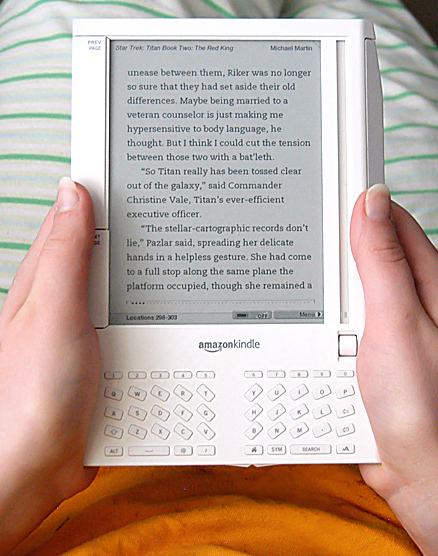The Times notes that many readers are complaining, not to say outraged, about the idea of paying more than $9.99 for e-books—the price that Amazon has aggressively promoted in its effort to sell Kindles.
At Publishers Lunch, his indispensable blog/newsletter, Michael Cader had a terrific piece yesterday debunking some notions implicit in the NYT article, and urging publishing people do to a better job of explaining to the public the widely held fallacies about e-book prices. I’ll write more about this myself, but his points are so cogent that I might as well start by quoting some of them:
* $9.99 never was the top e-book price; people pay more than that every day
[When there was no Kindle, many e-books, including those for Sony Reader cost well above $9.99. And from the beginning of the Kindle store, plenty of titles were above that price. As Cader notes elsewhere, three recent surveys, two presented at Digital Book World, one this week by Goldman Sachs, strongly suggest that while price is important to e-book buyers, there are—as you’d expect--more important elements to a buying decision, such as author reputation.]
* The implicit, false promise of cheap e-books was made by the people who profit, at very nice margins, from selling the devices, not by publishers. Please blame them if you feel deceived. [Right. Amazon has sold “millions” of Kindles by Jeff Bezos’s account. Which means, at the prices they charge, they are raking in hundreds of millions on Kindle hardware. Was it a coincidence that Amazon had its biggest profits ever last year?]
* Publishers are lowering their ebook prices
Most stories say publishers are raising prices. We in the trade know that publishers are preparing to lower their ebook prices by 50 percent or more, and reduce their own profit margins. But customers don't; they hear that publishers are raising prices. [Another key point. Publishers are actually looking to take less per book than they have been getting from Amazon. And in general e-book list prices are coming down.]
* The new "top price" is going to be $12.99 more often than not
[Cader notes that this will depend on what deals publishers arrive at with Apple, but in general we’re talking about a rise of a couple of dollars.]
Cader’s piece also makes one other important point:
Publishers are hoping to protect smaller and local retailers and ensure that customers have a wide range of real bookstores and online e-bookstores to choose from.
Publishers are hoping to protect smaller and local retailers and ensure that customers have a wide range of real bookstores and online e-bookstores to choose from.
Right again. Low prices are a weapon used by big, deep-pocketed merchants, typically chains, to crush their small, local competitors. Publishers don’t want to see a marketplace that consists of nothing but Amazon and Barnes & Noble. This is, to be honest, partly because most of us in the business have a sentimental attachment to old-fashioned bookstores, the kinds of places where most book-lovers love to hang out. It is partly because we know that it’s in those independent stores that surprise, hand-sold hits can catch fire and turn into bestsellers. But it’s also because we don’t want to find ourselves with nothing but 600-pound gorillas for customers.
